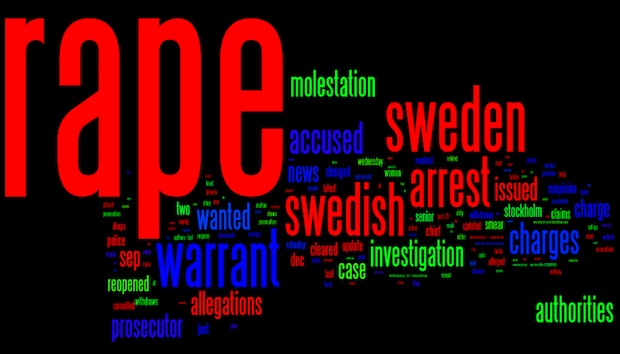
Founder Julian Assange is facing charges for violating a Swedish law about sex without condoms, rather than a mainstream interpretation of “rape.” Yet that’s the charge reports often levy against him. Behold the smear campaign.
The New York Times wrote about the case on Thursday, noting that Swedish authorities were hunting Assange on charges of “rape, sexual molestation, and unlawful coercion.” It commented on the alleged offense, stating claims by two women that “each had consensual sexual encounters with Mr. Assange that became nonconsensual.”
The Swedish charges aren’t exactly new, though. Some of the media had reported “rape” allegations back in August, and the Daily Mail even asserted the first alleged illegal act occurred when a condom broke, and the woman concerned “whatever her views about the incident,” then “appeared relaxed and untroubled at the seminar the next day.” At this seminar, Assange met the second alleged victim and “a source close to the investigation said the woman had insisted he wear a condom, but the following morning he made love to her without one.”
Assange has questioned the “veracity” of the two women’s statements, as the Times report notes. Assange’s former lawyer yesterday “confirmed” the charges were to do with sexual misconduct concerning sex without condoms. Assange’s current lawyer then revealed Swedish prosecutors had told him they were not seeking Assange for “rape” at all, instead the alleged crime is “sex by surprise,” which carries a penalty of a fine, although the details of the allegations haven’t been revealed yet.
Then came the Interpol warrant, and with it, a new life for the previous rape accusations.
But few outlets are as concerned as the Times with nuance. Washington’s Blog, to its credit, does report that the Swedish arrest warrant–and the following Interpol alert, adding Assange to its “most wanted” list–makes no reference to “rape.” Instead Assange is being sought for sexual “coercion,” after engaging in what was an allegedly non-consensual sex act with two women on two separate occasions within a short space of time. The act in question was sex without a condom, seemingly without the consent of the two women involved. Assange is also alleged to have been reluctant to submit to medical tests for sexually transmitted diseases. The two women reported him to the police, together, leading to the first arrest warrant for “rape,” from a duty prosecutor, which was quickly canceled, then a later warrant for “sexual coercion.”
A Google search for “Julian Assange rape” returns over 445,000 responses. See the above wordcloud generated from the top 50. The stand-out word is obvious. And while some of these results include Assange’s statements alleging a “dirty tricks” campaign, there are more damning mainstream links, such as a September 1st story from the Associated Press, picked up by the Huffington Post and headlined, “Julian Assange Rape Investigation Reopened: Sweden Probing Wikileaks Founder.” The body of the text mentions Sweden’s chief prosecutor’s comments noting there was “no reason to suspect that Assange, an Australian citizen, had raped a Swedish woman who had reported him to the police,” and the AP notes that the new warrant was for “sexual coercion and sexual molestation” which “overruled a previous decision to only investigate the case as ‘molestation,’ which is not a sex offense under Swedish law.” In other words, the AP’s text implies no mention of “rape” but the hot eye-grabbing headline does–it’s an old libel loophole. The “rape” part technically describes the investigation, not what Assange allegedly did.
We’re absolutely not condoning non-consensual sex acts in any way, but arguably this story isn’t about subtleties of semantics and centers on the labyrinthine–and seemingly nation-specific–laws Assange has violated. Yet the very Internets that Assange is using to crusade against government secrecy have enabled an almost unavoidable link between the words “Assange” and “rape” regardless of the precise nature of the allegations against him. Assange’s character is thus extensively digitally smeared whether or not he is actually found guilty in court.
Call it a trial by Internet, a jury of Assange’s peers.